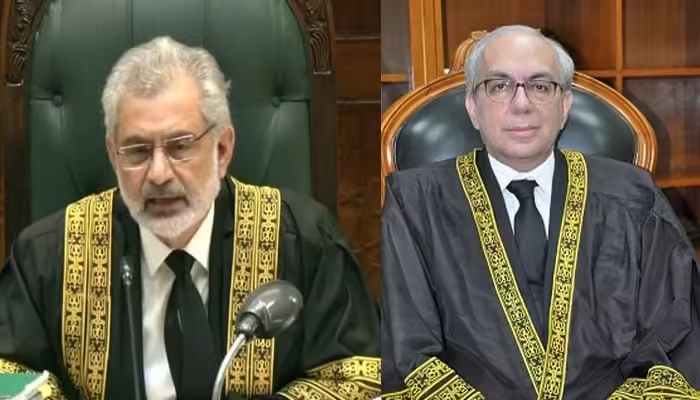The Supreme Court of Pakistan postponed a crucial hearing on the review appeals regarding the interpretation of Article 63A of the Constitution after Justice Muneeb Akhtar failed to appear in court. The hearing, which commenced with Chief Justice Qazi Faiz Isa and other members of the bench, faced a temporary setback due to Justice Akhtar’s absence and a letter he sent to the Supreme Court’s registrar.
Background of Article 63A Case
Article 63A of the Constitution addresses the disqualification of members of Parliament due to defection, an issue that has gained significant political and legal importance in Pakistan. The review appeals being heard stem from a prior decision by a five-member bench, and the case has been ongoing for more than two years. The current hearing was intended to reassess this decision and provide further clarity on the interpretation of Article 63A, which plays a crucial role in Pakistan’s democratic governance.
Justice Muneeb Akhtar’s Absence
When the hearing began, Chief Justice Qazi Faiz Isa and Justices Aminuddin, Jamal Mandukhel, and Mazhar Alam took their places on the bench. However, Justice Muneeb Akhtar did not join them, prompting the Chief Justice to address the issue immediately.
Chief Justice Isa called upon Attorney General Mansoor Usman Awan and remarked that a larger bench had been formed to hear the case, a bench that originally consisted of five members. Justice Muneeb Akhtar, who was part of the original bench, had instead submitted a letter to the Supreme Court’s registrar explaining his reasons for not attending the hearing.
The Chief Justice read Justice Akhtar’s letter aloud during the hearing to clarify his absence. In the letter, Justice Muneeb Akhtar explained that he was not apologizing for hearing the case but was refraining from being part of the bench constituted by the Practice and Procedure Committee, stating that he could only excuse himself from the bench in court, not through a private letter.
The Contents of Justice Muneeb Akhtar’s Letter
In his letter, Justice Akhtar elaborated that while he was not refusing to sit on the bench, he could not be part of the current bench because it was formed by the Practice and Procedure Committee. He noted that his decision should not be misinterpreted as reluctance to hear the case, and his letter should be made part of the review case record.
Chief Justice Qazi Faiz Isa responded by stating that it is not a common practice to make such letters a part of court records and emphasized that it would have been preferable for Justice Muneeb Akhtar to share his opinion while sitting on the bench. The Chief Justice also expressed his respect for dissenting opinions, underscoring the importance of judicial discourse.
The Significance of Article 63A
Chief Justice Isa reiterated the importance of the case, noting that the interpretation of Article 63A holds substantial significance for the governance of Pakistan. He emphasized that any refusal by a judge to hear such a critical case should occur in court, not through personal correspondence. The Chief Justice remarked, “The case of Article 63A is very important, and the judge’s refusal to hear the case should be a public matter.”
The review appeals on Article 63A are critical because they directly impact the legal framework governing parliamentary defection and disqualification, which in turn affects the political stability of the country. Given the relevance of this case to ongoing political dynamics, the bench was keen to resolve the matter promptly.
Next Steps and Bench Reconstitution
Chief Justice Qazi Faiz Isa expressed hope that Justice Muneeb Akhtar would reconsider and join the bench for the next hearing. However, he made it clear that if Justice Akhtar chose not to rejoin, the court would reconstitute the bench with other available judges. The Chief Justice remarked that the court’s functioning could not be halted simply because one member opted not to participate, stating, “The Supreme Court cannot stop working. We are here to decide cases.”
The Chief Justice went on to acknowledge that while judges have the discretion to withdraw from cases, the court must continue to function, especially in matters that have widespread implications for governance.
Legal and Constitutional Debate
During the hearing, Barrister Ali Zafar, representing one of the petitioners, raised concerns about the formation of the committee that constituted the bench. He argued that the committee could not make decisions without the inclusion of senior judges such as the Chief Justice of Pakistan. In response, Chief Justice Isa clarified that the law passed by Parliament was not intended to leave constitutional rights unaddressed or allow the Supreme Court to remain inactive. He emphasized that even if certain members chose not to participate, the judicial process must continue.
The Supreme Court adjourned the hearing on the review appeals concerning the interpretation of Article 63A until 11:30 AM the following day. Chief Justice Qazi Faiz Isa remains hopeful that Justice Muneeb Akhtar will rejoin the bench, but if not, the court will move forward with alternative judges. The hearing’s adjournment reflects the delicate balance between judicial independence and the necessity of resolving critical constitutional questions that have a profound impact on Pakistan’s political and legal landscape.
The outcome of the review appeals on Article 63A will likely set important precedents for future cases of parliamentary defection and may influence the broader discourse on constitutional law in Pakistan.



